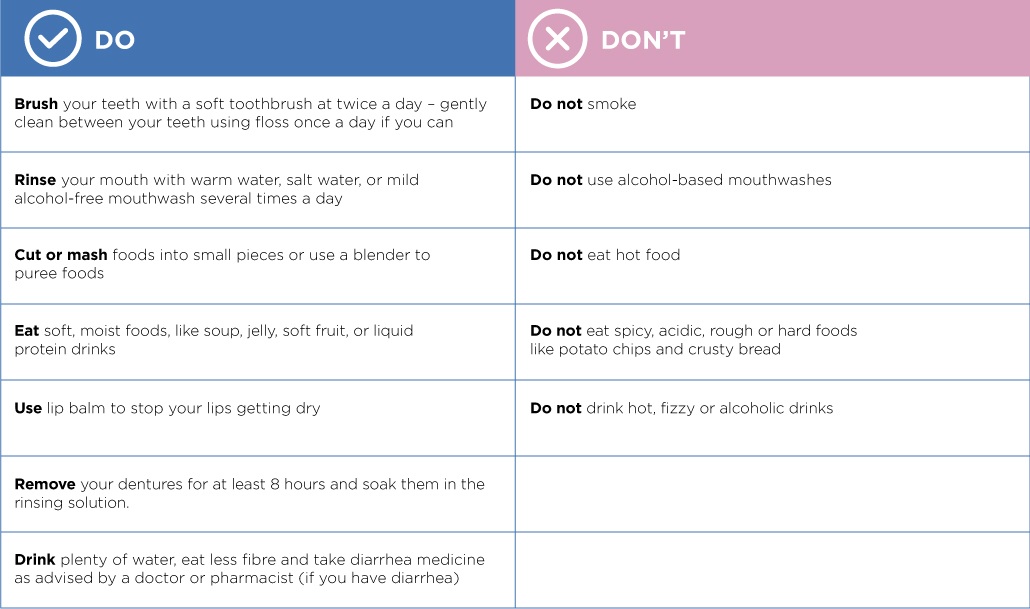About Oral Mucositis
What is Oral Mucositis or Mouth Sores1?
Oral mucositis (mouth sores) refers to painful open sores with swelling and redness of the lining of the mouth called the mucosa.
These painful mouth sores or oral lesions (injuries) come in a variety of forms, from many small sores to larger more severe ulcers. It often shows up as a sore mouth and throat and can also include redness, swelling and painful sores on the tongue, gums, lips, or throat.
Oral mucositis often occurs with cancer treatments which can damage the cells lining the mouth and uncover some of the nerves in the mouth. Touching the bare nerves results in pain when they are touched by anything in the mouth including eating, drinking and just moving the tongue around.
Oral mucositis can be a serious problem in patients getting chemotherapy or radiotherapy for cancer. Sometimes these mouth sores can be so painful that they may even prevent the swallowing of food and drink which may result in an individual being fed by a tube or being hospitalized.
It is a painful condition that may be the cause for reducing, delaying, or stopping cancer therapy.

Places that oral mucositis appears in the mouth

Patient undergoing radiation therapy for head and neck cancer. Markings on the mask identify where radiation needs to be applied.
Why do patients get oral mucositis?
The lining of the mouth is sensitive and can be easily damaged. Radiation therapy and chemotherapy can damage both healthy cells and cancer cells in the mouth. The symptoms of oral mucositis are due to chemotherapy or radiotherapy breaking down this lining, creating sores, and exposing the nerve endings in the mouth which are painful when touched.
Who gets oral mucositis?
Oral mucositis can affect people of all ages and sex who are receiving radiotherapy and/or chemotherapy.
“Younger patients tend to develop oral mucositis more often than older patients being treated for the same cancer with the same medical treatment. However, the healing of oral mucositis is more rapid in the younger age group.”7
ORAL MUCOSITIS OCCURS IN2,8:
Chemotherapy patients
| 20% to 40% |
Patients being treated for solid tumours with chemotherapy which kills cancer cells in the bone marrow and normal cells as well. |
Bone Marrow Transplant Patients
| 75% to 100% |
Patients receiving stem-cell transplantation so they can make new blood cells again (chemotherapy is used to prepare the patients system beforehand). |
Radiotherapy patients
| 85% to 100% |
Patients getting radiation therapy (radiotherapy) for head and neck cancer. |
What are the signs and symptoms of Oral Mucositis?3,4,5
The symptoms of mucositis in the mouth usually begin around a week after starting chemotherapy, or about 2 weeks after starting radiotherapy.
Symptoms of oral mucositis may include:
- Redness (irritated), shiny or swollen mouth and gums
- Burning sensation, feeling of dryness, or pain when eating food
- Painful eating, drinking, swallowing or talking
- Mouth ulcers (sores) in the mouth or on the gums or tongue
- Loss of taste
- Soft whitish patches or pus in the mouth or on the tongue
- Increased amounts of thickened saliva in the mouth
- A fungal mouth infection (oral thrush)
Risk Factors
How severe a patients symptoms are will depend on the type of treatment the patient is having and other risk factors such as:
- Poor oral or dental health, gum disease.
- Smoking or chewing tobacco.
- Drinking alcohol.
- Gender (females appear to be more likely than males to develop mucositis).
- Dehydration.
- Poor nutrition, very underweight.
- Earlier cancer treatment.
- Chronic irritation from poor-fitting denture or dental appliances.
- Having diseases such as kidney disease, diabetes or HIV/AIDS.
- The use of the drug methotrexate may worsen lesions of oral mucositis.
How does Oral Mucositis effect daily life
Watch for signs of mucositis, which should be treated as soon as possible. The symptoms of mucositis can be mild, requiring only a little attention, but they can also be severe. Patients may feel pain and have trouble eating and drinking, swallowing, speaking and sleeping.
Oral mucositis can:
- Cause pain
- Restrict the type or quantity of food and drink patients can have
- Give you trouble eating drinking, swallowing and speaking
- Result in rapid weight loss due to difficulty eating
- Result in stopping or delaying of cancer therapy
- Increase the risk of infection in the mouth
- Require the use of antibiotics and narcotics
- Lead to hospitalization and Increase the length of hospital stay
- Increase the overall cost of treatment.

Severe mouth sores may result in lowering the chemotherapy dose making the therapy longer or stopping or taking breaks in radiation treatment. It may even mean stopping of cancer therapy or being fed by tubes inserted in the body and being hospitalized.
When Do Symptoms Develop and How Long Does Oral Mucositis Last?1,6
The symptoms of oral mucositis usually appear in the first 5-10 days of starting radiotherapy and continue over the 5-7 weeks of radiation therapy and can last 3-4 weeks after radiation is stopped. The same thing applies to combined radiation and chemotherapy.
For chemotherapy alone, the symptoms can also appear within 5-10 days of starting but it will appear in repeating cycles linked to the cycles of chemotherapy treatment, and the type of chemotherapy used. Those receiving four to six cycles of chemotherapy or immunotherapeutics will endure 68 days to 102 days or 17 days per cycle of mucositis cumulatively throughout their treatment.
Can Oral Mucositis be prevented?3,4,5
While oral mucositis cannot be prevented there are some things that can be done to help ease the symptoms of mucositis while having chemotherapy or radiotherapy.

Chart adapted from NHS and Canadian Cancer Society3,4,5
How is Oral Mucositis Managed5?
Maintain a good oral health routine as suggested by the cancer team. This will help to reduce the risk of oral mucositis (mouth sores) developing and it’s painful symptoms and possibly reduce the length of time they are experienced. If symptoms develop they should be reported to the cancer team as they will be able to recommend the best treatments and pain relief options.
Some of the treatments may consist of special anesthetic mouthwashes or gel coatings like Gelclair® which helps protect the lining of the mouth and relieve the pain of mouth sores.
Questions? Check out the FAQs
This product may not be right for you. Always read and follow the label and consult your healthcare provider regularly to discuss whether this medicine is working for you and if it is causing you any unwanted effects.
We cannot diagnose or prescribe treatment for individual conditions.
If you think you may have a medical condition, please visit your doctor.
References
1. Lalla R et al. Management of Oral Mucositis in Patients with Cancer, Dent Clin North Am. 2008 January ; 52(1): 61–viii, https://www.ncbi.nlm.nih.gov/pmc/articles/PMC2266835/
2. Peterson, Douglas; New strategies for management of oral mucositis in cancer patients, J Supportive Oncology, 2006 Feb 4 (2 Suppl 1):9;1, https://pubmed.ncbi.nlm.nih.gov/16499139/
3. Oral Cancer Foundation, https://oralcancerfoundation.org/complications/mucositis/
4. NHS UK Mucositis https://www.nhs.uk/conditions/mucositis/#:~:text=If%20you%20have%20mucositis%20in,your%20mouth%20moist%20(saliva%20substitutes)
5. Canadian Cancer Society – Sore Mouth and Throat, https://cancer.ca/en/treatments/side-effects/sore-mouth-and-throat
6. McCullough, Ricky Wayne, Actual duration of patient-reported mucositis: Far longer than 2 to 4 weeks and may be avoidable altogether, Korean Journal of Clinical Oncology 2016;12:1-6 http://dx.doi.org/10.14216/kjco.16001, pISSN 1738-8082 ∙ eISSN 2288-4084
7. Chemotherapy-Induced Oral Mucositis Updated: Mar 14, 2023 Author: Nathaniel S Treister, DMD, DMSc; Chief Editor: Jeff Burgess, DDS, MSD
8. Lalla RV, Bowen J, Barasch A, et al: MASCC/ISOO clinical practice guidelines for the management of mucositis secondary to cancer therapy. Cancer 120: 1453-1461, 2014
